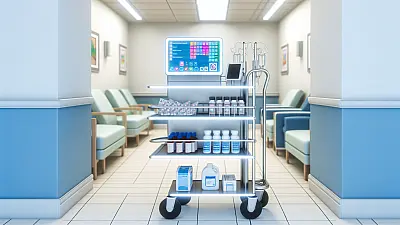STRATFORD, IOWA - State health inspectors documented that Stratford Specialty Care failed to maintain and replace critical respiratory equipment for a resident, with nebulizer tubing and mask remaining unchanged since October 2024 despite facility policies requiring weekly replacement.

Respiratory Equipment Left Unchanged for Over Seven Months
During a May 2025 inspection at the 36-bed facility, surveyors discovered that Resident #33's nebulizer equipment had not been replaced since October 14, 2024. The nebulizer mask and tubing, which facility policy mandates should be changed weekly, remained at the resident's bedside for approximately 218 days past the required replacement date.
Inspectors observed the equipment on May 18 at 9:24 AM, noting the nebulizer machine positioned on the bedside table with tubing connected and the mask/chamber placed behind it. The equipment bore a date marking of "10/14/24" and showed visible signs of deterioration. The mask exhibited accumulation of dust particles and dried liquid spots, indicating prolonged neglect of basic equipment maintenance protocols.
The discovery becomes particularly concerning given that respiratory equipment requires regular replacement to prevent bacterial growth and ensure effective medication delivery. Nebulizer masks and tubing can harbor bacteria, mold, and other pathogens when not properly maintained, potentially introducing infections directly into a patient's respiratory system. Standard medical protocols call for weekly replacement of these components specifically to prevent such contamination.
Vulnerable Resident Left with Contaminated Equipment Despite Discontinued Treatment
The affected resident presented significant vulnerabilities that heightened the severity of this oversight. Medical records indicated Resident #33 had a Brief Interview for Mental Status (BIMS) score of 00, indicating severe cognitive impairment. The resident's medical history included cerebrovascular accident (stroke), aphasia affecting speech capabilities, and dysphagia creating swallowing difficulties. The resident required feeding tube assistance, underlining their complete dependence on staff for basic care needs.
Review of medical records revealed that Resident #33 had been admitted with an order for albuterol sulfate nebulization treatments every four hours as needed. However, a progress note from February 28, 2025, documented that the albuterol nebulizer solution had been discontinued due to non-use. The resident's medication administration records showed only three nebulizer treatments had been administered in January 2025 - on the 6th, 10th, and 11th.
Despite the discontinuation of treatments nearly three months before the inspection, the contaminated equipment remained at the bedside. This oversight created unnecessary infection risks for a cognitively impaired resident unable to advocate for their own safety or request equipment removal.
Medical Risks of Contaminated Respiratory Equipment
Contaminated nebulizer equipment poses serious health risks, particularly for vulnerable nursing home residents. When nebulizer masks and tubing are not replaced according to schedule, they become breeding grounds for bacteria including Pseudomonas aeruginosa, Staphylococcus aureus, and various fungal organisms. These pathogens thrive in the warm, moist environment created by respiratory equipment.
For elderly residents with compromised immune systems, exposure to contaminated respiratory equipment can lead to pneumonia, bronchitis, and other serious respiratory infections. The accumulation of dried medication residue, as observed on Resident #33's mask, can also affect medication delivery efficiency and create additional surfaces for bacterial colonization. Even when treatments are discontinued, leaving contaminated equipment at bedside creates cross-contamination risks, as airborne particles can spread to other surfaces in the resident's immediate environment.
The seven-month period during which this equipment remained unchanged exponentially increased these risks. Medical literature indicates that bacterial colonization of respiratory equipment can begin within 48 hours of use, with dangerous biofilm formation occurring within days to weeks.
Facility Response and Policy Violations
When confronted with the findings on May 20 at 8:05 AM, the Assistant Director of Nursing (ADON) accompanied the surveyor to Resident #33's room. The ADON acknowledged both the October 2024 date on the equipment and the visible contamination, stating "she thought the machine was being rented." The ADON immediately disposed of the tubing and mask/chamber and removed the nebulizer machine for sanitization.
The ADON confirmed that facility expectations required "to change the nebulizer tubing and masks weekly on Sunday and document either on the MAR or TAR." This admission highlighted a clear deviation from established protocols. The facility's own policy, titled "Inhalation Treatment with Machine" and dated January 2015, explicitly documented requirements to replace tubing apparatus weekly and perform nightly cleaning of equipment per manufacturer's instructions, with proper labeling and dating after each cleaning.
The failure to follow these established protocols represents a breakdown in multiple quality assurance systems. Weekly replacement schedules exist as minimum standards in respiratory care, with many facilities opting for more frequent changes for actively used equipment. The facility's inability to maintain even this basic standard for over seven months indicates systemic failures in equipment monitoring and staff accountability.
Industry Standards and Proper Respiratory Care Protocols
Healthcare facilities must maintain strict protocols for respiratory equipment maintenance to meet Centers for Medicare & Medicaid Services requirements and industry best practices. Standard protocols include weekly replacement of all nebulizer tubing and masks, daily cleaning of reusable components, and immediate disposal of single-use items after each treatment. Documentation systems should track replacement dates, cleaning schedules, and equipment assignments to ensure compliance.
When treatments are discontinued, proper protocol requires immediate removal and sanitization of equipment to prevent contamination risks and ensure availability for other residents who may need respiratory support. The presence of discontinued equipment at bedside for months suggests inadequate communication between nursing staff, respiratory therapy, and housekeeping departments.
This violation at Stratford Specialty Care demonstrates the critical importance of systematic equipment monitoring and the potential consequences when basic infection control measures fail. The facility's reported census of 36 residents suggests this may not be an isolated incident, raising questions about respiratory equipment maintenance for other residents receiving similar treatments.
Full Inspection Report
The details above represent a summary of key findings. View the complete inspection report for Stratford Specialty Care from 2025-05-21 including all violations, facility responses, and corrective action plans.
💬 Join the Discussion
Comments are moderated. Please keep discussions respectful and relevant to nursing home care quality.